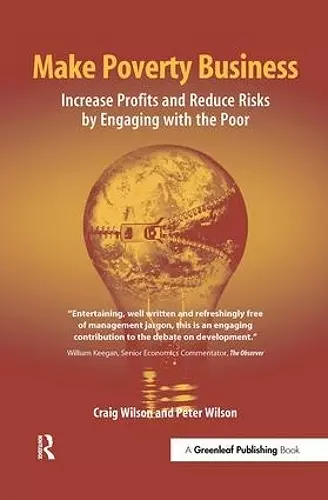Make Poverty Business
Increase Profits and Reduce Risks by Engaging with the Poor
Peter Wilson author Craig Wilson author
Format:Hardback
Publisher:Taylor & Francis Ltd
Published:1st Nov '06
Currently unavailable, and unfortunately no date known when it will be back

This book explores how businesses can effectively engage with the poor in developing countries, offering practical strategies to transform poverty into profitable opportunities while fostering economic development and innovation.
Make Poverty Business seeks to transform the approach of multinational corporations toward engaging with impoverished communities. It emphasizes the importance of developing low-risk, cost-effective strategies that allow businesses to positively impact the lives of people living in poverty. The book argues that poor individuals in developing nations can serve as valuable suppliers, employees, and customers, yet they are frequently overlooked by major companies. This neglect not only exacerbates poverty but also results in increased risks and costs for businesses, as well as missed sales opportunities.
The authors present a compelling case for integrating economic development into the core interests of corporations rather than relegating it to corporate social responsibility initiatives. By constructing a solid business rationale for engaging with the poor, the book encourages companies to view poverty as an opportunity for innovation and growth. It explores how businesses can leverage a poverty perspective to develop new products, enhance supply chain competitiveness, and create sustainable, cost-effective business models in developing markets.
Make Poverty Business serves as a vital resource for international business managers aiming to boost profits while mitigating risks in emerging economies. It also appeals to development advocates who wish to align profit motives with poverty alleviation efforts, as well as academics seeking practical strategies for implementing bottom-of-the-pyramid initiatives. Overall, the book presents an engaging and insightful contribution to the ongoing conversation about development and the role of business in addressing global poverty.
This slim volume takes Prahalad's bottom of the pyramid philosophy and makes it actionable for the business manager who lives in blissful ignorance of international development jargon. A great airplane read, it also avoids the 'well, duh' statements that infect so many management books. I highly recommend it. http://psdblog.worldbank.org/psdblog/2007/01/three_new_books.html World Bank and IFC Private Sector Development Blog, 5 January 2007, Based on economic theory and good business practice, this easy-to-read account outlines the incentives for multinational leaders to do business with poor people in developing countries. In doing so, it revives the debate regarding the definition of corporate social responsibility, with the co-authors claiming multinational companies' engagement in lesser developed countries cannot be classed as CSR. Follow-up questions and further reading suggestions will stimulate wider discussion on whether to support their case for making poverty business, long after you put this book down. Corporate Citizenship Briefing, January 2007 Rarely can the saying "You can't judge a book by its cover" have been as true as in this case: the cover is dreadful! Which makes it all the more extraordinary when you dip in to find that the Wilsons - no relation, they explain - have produced a book packed with insight on one of the defining issues of the 21st century: the eradication of poverty. Their style is disarming and charming. "When thinking about poverty," they say, "we've tried to think like carbon-based life forms rather than economists." Whereas the typical business blockbuster these days offers to reveal an impending revolution, the Wilsons reassure us that there is "no new paradigm here, no redefinition of the corporation, no need for a business revolution". Their ambition sounds deceptively simple: "We hope that a manager who reads this book and then starts talking to a wider range of people and reading from a wider range of sources will start to make better decisions." They offer sympathetic, helpful assessments of what it is like to be an expatriate manager or a government bureaucrat in a non-industrialised country. One of their friends "has just been promoted in a major multinational and been told that he'll be sacked unless he meets his annual targets. It's hard", they say, "for him to focus on corporate reputation or long-term profitability or, for goodness' sake, poverty reduction when his mortgage and his kids' schooling depend on how much profit his small bit of the company makes over the next twelve months." Alternatively, try putting yourself in the shoes of government officials in non-industrialised countries. "They are often incredibly poor," the Wilsons explain, "operating in a severely dysfunctional bureaucracy, and with very low levels of autonomy." In case all of this sounds like apologies for the folk who stall the eradication of poverty, it isn't. It's an attempt to provide the reality check needed to ensure that future efforts do not dribble away, as so many have before. The authors stress that poverty is dangerous because of its role as "a crucible for terrorism and instability", and that it masks some of the greatest potential market opportunities of the new century. But they warn against new forms of irrational exuberance. For those who would argue that C. K. Prahalad scooped them with his Fortune at the Bottom of the Pyramid, the Wilsons note, "You'd be well advised to read his book first before starting on ours because he does the motivation, the ambition and the shining city on the hill. We're more interested in replacing a few light bulbs down here in the valley." If you're an anti-globaliser, the book's worth reading just for its discussion of how China's development has helped pull millions out of poverty. No need to agree on every point; indeed, a key reward is having your assumptions poked. -- John Elkington Resurgence 243 (July/August 2007)
ISBN: 9781874719960
Dimensions: unknown
Weight: 408g
192 pages